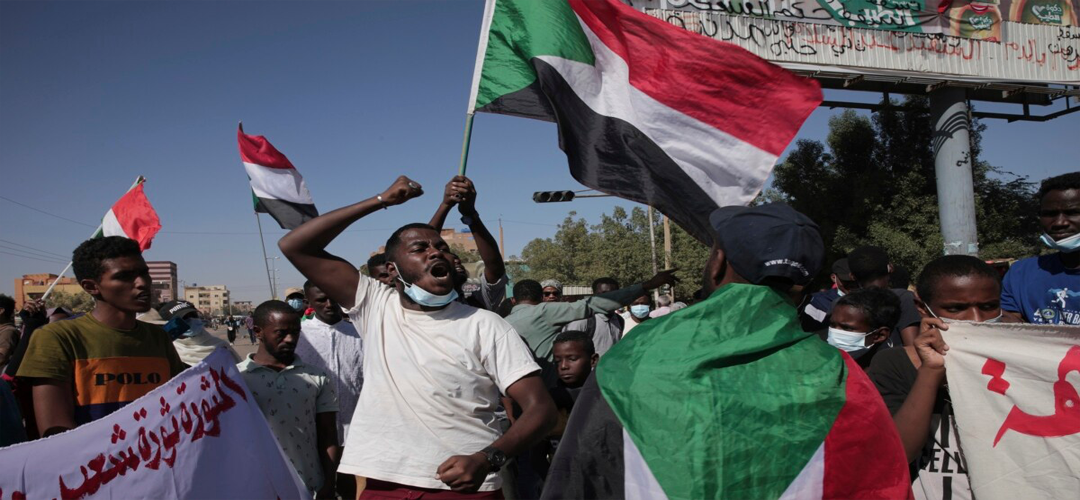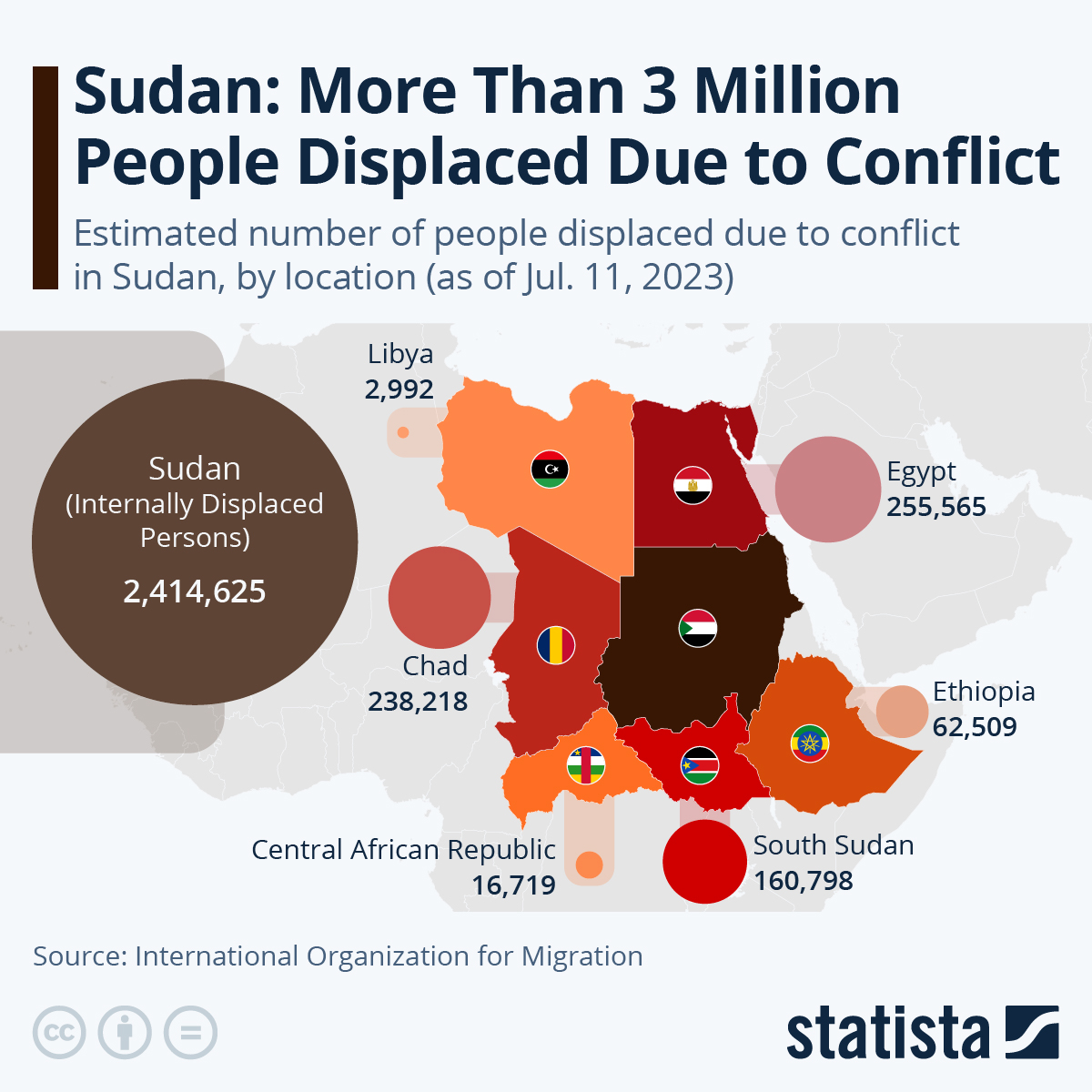Sudan’s Continuing Agony
July 15, 2023 | Expert Insights

Sudan's political condition continues to spark international concern as the North African country is embroiled in military conflict and political turmoil. The conflict erupted in the capital Khartoum due to a power struggle between competing military factions. The clashes are between the Sudanese Army and a paramilitary force called the Rapid Support Forces (RSF).
After suffering through a series of political uprisings, a military coup and a relatively peaceful period under a military junta, Sudan plunged back into internecine conflict in mid-April 2023. This time, it was a bitter struggle for military and political supremacy between the Army led by General Abdel Fattah al-Burhani and his closest rival, the mercurial head of paramilitary Rapid Support Forces (RSF) Mohamed Hamdan “Hemedti” who earned a fearsome reputation for brutality in the Western province of Darfur. The country has sunk into a humanitarian crisis, with more than 2.2 million displaced people.
The conflict affects India, which has several ongoing investments, projects, and trade deals with Sudan.
Background
Located in northeast Africa, Sudan is one of the continent's largest countries and one of the poorest. It is also blessed with a large fertile stretch of the River Nile Valley and significant petroleum deposits.
The British colonised Sudan in the late 19th century and set up an Anglo-Egyptian Condominium in 1899. Sudan was split into two regions, with the north ruled by Egypt and the south ruled by Britain. A lengthy struggle by Sudanese nationalists culminated in the country’s independence from Britain and Egypt in 1956, making it the first African country to win its independence.
However, the conflict between the northern and southern regions continued to cause political instability, largely due to the economic and political marginalisation of the south. Democratic governments were short-lived since they were interrupted by military coups resulting in authoritarian governments with harsh crackdowns on political opposition.
In 1989, General Omar al-Bashir seized power through a coup. Bashir’s harsh regime witnessed violence against the rebels of southern Sudan. In 2011, South Sudan gained independence through a UN-brokered and supervised agreement stretched over almost a decade, but it led to further conflict, economic issues, and political instability. Control of the oil-rich disputed pocket of Abyei remains a bone of contention between the two countries.
In 2019, Bashir was overthrown by a popular revolt after 30 years of rule. Civil unrest ensued as the public protested against the new military government, demanding democracy. The military and civilian protesters came to a power-sharing agreement to lead Sudan to elections in 2023.
However, in 2021, another military coup took place, and since then, Sudan has been ruled by a council of generals with the head of the armed forces, General Abdel Fattah al-Burhan ruling the country. The rivalry grew between him and his second-in-command, General Mohamed Hamdan Dagalo or Hemedti, which eventually broke out into armed conflict.

Analysis
War and civil instability in Sudan have regional ramifications, which could spiral out of control, impacting neighbouring Egypt and the fragile nations of South Sudan and Chad.
Sudan is rich in oil reserves, even though its economy has been unable to capitalise on its oil resources due to political instability, war, corruption, and lack of infrastructure. The Sudan crisis concerns several world powers, including the U.S., Russia, and China who are vying for influence in the country. It also affects India, not least because of the large number of Indians who were stranded in Sudan when the conflict erupted.
India and Sudan share significant trade and commercial relations, particularly in the oil and agriculture industries. Indian imports from Sudan in 2022 amounted to $177.32 million, and Indian exports to Sudan amounted to $1.68 billion.
Political and economic instability in Sudan have consequences for India. Sudan is a key supplier of crude oil to India. Disruptions to oil production and supply from Sudan lead to higher oil prices, increasing the cost of oil imports for India. This can play into inflation and affect the overall economy, particularly since oil is an important import required for several leading industries.
India's major oil investment in Sudan began when Sudan was looking to widen its Asian economic trading partners to overcome Western sanctions and China's dominance in the region. In addition to imports, Indian exports to Sudan grew, with the pipe maker PSL Ltd. gaining a contract worth $190 million to supply the pipeline for an oil development project in Sudan.
Indian companies have substantial investments in Sudan, specifically in the oil sector. India is one of the top five investors in Africa. The crisis in Sudan impacts the investment climate and reduces the viability of the business for Indian firms operating there. India has invested more than $3 billion in Sudan and South Sudan, predominantly in the energy sector, out of which $2.4 billion has gone through ONGC Videsh, an overseas subsidiary of ONGC in the petroleum sector. In 2021, India had 49 bilateral projects with Sudan in Sudan's energy, transport, and agribusiness industries, based on concessional lines of credit.
Sudan is also a key supplier of gum Arabic, a major input in the food industry. Disruptions to its production and supply could affect the Indian food industry, which heavily relies on imports. Additionally, India has been involved in several infrastructure development projects in Sudan. The conflict in Sudan could affect the progress of these projects.
With an area of about 1.8 million km2, it is among Africa’s largest countries and as per an FAO report, it has tremendous potential for agriculture and could become Africa’s breadbasket. Its fertility is drawn from its location between the desert in the north region and the fertile, humid savannah belt in the south. The Nile Valley runs south to north, and its perennial tributaries are bordered by vast, fertile riverbanks and plains suitable for building a thriving agriculture and livestock economy.
In 2016 when Sudan was passing through a relatively peaceful period in its history, the Sudanese government under President Bashir invited India to invest in its agriculture sector, noting that Indian farmers were welcome to cultivate land in Sudan "not only to feed Sudan but also for the export market. By investing in Sudan, India can easily sustain its market. The farming technologies used by India are very much adaptable to African nations,” it was emphasised. Sadly, the invitation never saw any progress as the nation has been continuously under one strife or the other.
Assessment
- The crisis in Sudan has international implications because several world powers have political and economic interests in Sudan. It was just emerging from decades of sanctions by the West, especially the U.S. and was being rehabilitated in the comity of nations when the current crisis struck. Influential Arab nations have to step in and restore peace in Sudan. India can step in with humanitarian gestures.
- India and Sudan have substantial trade connections, most of all in the oil and agriculture sectors. In light of India’s oil deals with Sudan and its significant investments in the country, disruptions to oil production, supply, and business in Sudan have ramifications for India’s economy.
- India still has a good working relationship with the junta in power in Khartoum, as was shown by the smooth evacuation of Indian citizens. However, the Khartoum government is chary of any negotiations by India between the warring parties, considering the ongoing clashes an 'internal matter.' However, India’s track record in building government capacity in Sudan and development efforts positions it well to contribute to the country’s recovery once peace returns.








Comments